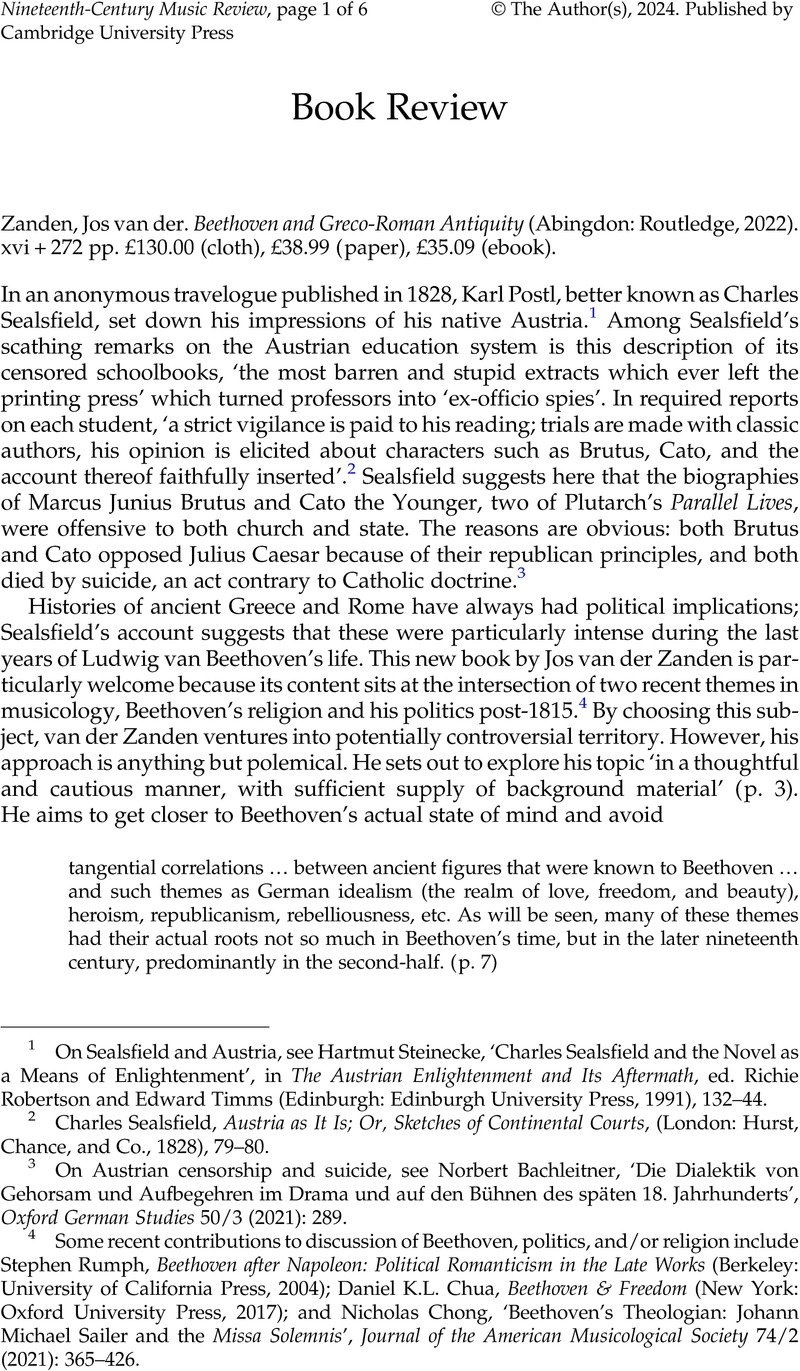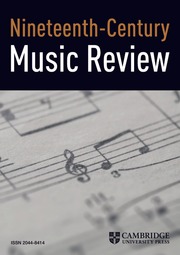No CrossRef data available.
Article contents
Zanden Jos van der. Beethoven and Greco-Roman Antiquity (Abingdon: Routledge, 2022). xvi + 272 pp. £130.00 (cloth), £38.99 (paper), £35.09 (ebook).
Review products
Published online by Cambridge University Press: 22 May 2024
Abstract

- Type
- Book Review
- Information
- Copyright
- Copyright © The Author(s), 2024. Published by Cambridge University Press
References
1 On Sealsfield and Austria, see Steinecke, Hartmut, ‘Charles Sealsfield and the Novel as a Means of Enlightenment’, in The Austrian Enlightenment and Its Aftermath, ed. Robertson, Richie and Timms, Edward (Edinburgh: Edinburgh University Press, 1991), 132–44Google Scholar.
2 Sealsfield, Charles, Austria as It Is; Or, Sketches of Continental Courts, (London: Hurst, Chance, and Co., 1828), 79–80Google Scholar.
3 On Austrian censorship and suicide, see Bachleitner, Norbert, ‘Die Dialektik von Gehorsam und Aufbegehren im Drama und auf den Bühnen des späten 18. Jahrhunderts’, Oxford German Studies 50/3 (2021): 289CrossRefGoogle Scholar.
4 Some recent contributions to discussion of Beethoven, politics, and/or religion include Rumph, Stephen, Beethoven after Napoleon: Political Romanticism in the Late Works (Berkeley: University of California Press, 2004)CrossRefGoogle Scholar; Chua, Daniel K.L., Beethoven & Freedom (New York: Oxford University Press, 2017)CrossRefGoogle Scholar; and Chong, Nicholas, ‘Beethoven's Theologian: Johann Michael Sailer and the Missa Solemnis’, Journal of the American Musicological Society 74/2 (2021): 365–426CrossRefGoogle Scholar.
5 For Berlioz, see Beate Angelika Kraus, ‘Who Is the Hero? The Early Reception of the Eroica’; for Bekker, see Leon Botstein, ‘The Eroica in the Nineteenth and Twentieth Centuries’, both in The Cambridge Companion to the Eroica Symphony, ed. Nancy November (New York: Cambridge University Press, 2020), 190–93, 207–10.
6 This argument is developed further in Jander, Owen, ‘Beethoven's “Orpheus in Hades”: The “Andante Con Moto” of the Fourth Piano Concerto’, 19th-Century Music 8/3 (1985): 195–212CrossRefGoogle Scholar.
7 Also note that Beethoven and Greco-Roman Antiquity is a revision of his doctoral dissertation at the University of Manchester, and he thanks Sieghard Brandenburg of the Beethoven-Haus Bonn for encouraging him to pursue this larger project.
8 For a preview, see van der Zanden, Jos, ‘Republican Beethoven: Fact and Fiction’, The Musical Times 161/1953 (2020): 27–36Google Scholar.
9 ‘Beethovens Vorstellung von der gesellschaftlich-nützlichen Tüchtigkeit des Individuums der altrömischen Virtus-Auffassung nähert’; Günter Fleischhauer, ‘Beethoven und die Antike’, in Bericht über den Internationalen Beethoven-Kongress 10.–12. Dezember 1970 in Berlin, ed. Heinz Alfred Brockhaus and Konrad Niemann (Berlin: Verlag Neue Musik, 1971), 478n51.
10 Reschke, Renate, ‘Selbst- und Weltverständnis in antiker Dimension: Anmerkungen zum Antikebild Ludwig van Beethovens’, Beiträge zur Musikwissenschaft 18/1 (1976): 69–106Google Scholar.
11 Maynard Solomon, ed., ‘Beethoven's Tagebuch of 1812–1818’, in Beethoven Studies 3, ed. Alan Tyson (Cambridge: Cambridge University Press, 1982), 193–288.
12 Maynard Solomon, ‘The Quest for Faith’, in Beethoven Essays (Cambridge, MA: Harvard University Press, 1988), 220, 223.
13 E. Kerr Borthwick, ‘Beethoven and Plutarch’, Music and Letters 79/2 (1998): 268–72.
14 Lewis Lockwood, ‘Beethoven, Florestan, and the Varieties of Heroism’, in Beethoven and His World, ed. Scott Burnham and Michael P. Steinberg (Princeton: Princeton University Press, 2000), 27–47.
15 Beethoven's first surviving conversation book dates from 1818; see Ludwig van Beethovens Konversationshefte, vol. 1, Hefte 1–10, ed. Karl-Heinz Köhler and Grita Herre (Leipzig: VEB Deutscher Verlag für Musik, 1972), 12, 29. The latest edition of Beethoven's correspondence, completed in 1997, contains 2292 letters to, from, or concerning Beethoven; 1237, or approximately 54 per cent, were written in or after 1817. See Ludwig van Beethoven, Briefwechsel Gesamtausgabe, vol. 7, Register, ed. Sieghard Brandenburg (Munich: G. Henle, 1998), x.
16 Much of van der Zanden's chapter on Bonn deals with Beethoven's education and his exposure to Schiller's works. The background on artistic life in Bonn in Élisabeth Brisson's book Le sacre du musicien: la référence à l'Antiquité chez Beethoven (Paris: CNRS Éditions, 2000) is a useful adjunct.
17 Van der Zanden's focus on detail here is complemented by a more wide-ranging study by Friederike Grigat, ‘Die Odyssee, Leitbild für Kunst und Leben: Beethoven im Sog der Homer-Begeisterung’, in Beethoven liest, ed. Bernhard R. Appel and Julia Ronge (Bonn: Beethoven-Haus, 2016), 203–50.
18 For Kant, see Daniel Doyle and José M. Torralba, ‘Kant and Stoic Ethics’, in The Routledge Handbook of the Stoic Tradition, ed. John Sellars (Abingdon: Routledge, 2016), 270–83. For Rousseau, see Christopher Brooke, Philosophic Pride: Stoicism and Political Thought from Lipsius to Rousseau (Princeton: Princeton University Press, 2012), 181–202.
19 Roger Bauer, ‘Das stoisch-josephinische Tugendideal in der österreichischen dramatischen Literatur der Grillparzerzeit’, Grillparzer Forum Forchtenstein (1967): 43–53. Beethoven scholars will know the excellent article on Grillparzer and Beethoven by Peter Höyng, but for others I cite it here: ‘For Heaven's Sake, I Will Have You Walk into the Dark: Grillparzer's Containment of Beethoven and the Ambivalence of Their Melusina Project’, Goethe Yearbook 17 (2010): 275–302.
20 T.H. Irwin, ‘Stoic Naturalism and Its Critics’, in The Cambridge Companion to the Stoics, ed. Brad Inwood (Cambridge: Cambridge University Press, 2003), 347.
21 This material was previously presented in Jos van der Zanden, ‘Beethoven and Euripides’, The Beethoven Journal 34/2 (2019): 69–76. The source, at the Bayerische Staatsbibliothek, is Friedrich von Drieberg, Arien und Gesänge aus der komischen Oper in drei Akten mit Tänzen: Der Hechelkrämer, (Berlin, 1813), https://opacplus.bsb-muenchen.de/permalink/49BVB_BSB/1mrtm42/alma991022717659707356 (accessed 16 March 2024).
22 Federica Rovelli, ‘Progetti abbandonati, esercizi e letture beethoveniane tra il 1815 e il 1816’, in Cara scientia mia, musica: Studi per Maria Caraci Vela, ed. Angela Romagnoli, Daniele Sabaino, Rodobaldo Tibaldi, and Pietro Zappalà (Pisa: Edizioni ETS, 2018), 456–9.
23 The names of the characters have been changed and, as far as I could tell without a detailed examination, only a couple of elements from the original plot were retained. The original novel is available in the digital collections of the Bayerische Staatsbibliothek: C[hristian] H[einrich] Spiess, Der Mäusefallen und Hechelkrämer: eine Geschichte sehr wunderbar und doch ganz natürlich (Frankfurt and Leipzig, 1793), https://mdz-nbn-resolving.de/details:bsb10120415/ (accessed 16 March 2024).
24 On Grillparzer see Robertson, Ritchie, ‘Poetry and Scepticism in the Wake of the Austrian Enlightenment: Blumauer, Grillparzer, Lenau’, Austrian Studies 12 (2004): 17–28CrossRefGoogle Scholar. On Grillparzer's poem ‘Die Ruinen des Campo Vaccino’ (‘The Ruins of Campo Vaccino’) Robertson directs the reader to August Sauer, ‘Proben eines Commentars zu Grillparzer's Gedichten’, Jahrbuch der Grillparzer-Gesellschaft 7 (1897): 30–135.
25 John Buckler, review of Carl Richard, The Founders and the Classics. Greece, Rome, and the American Enlightenment, in International Journal of the Classical Tradition 2/2 (1995): 305–6.
26 For instance, in David Benjamin Levy, Beethoven: The Ninth Symphony, rev. ed. (New Haven: Yale University Press, 2003), 30; and William Kinderman, Beethoven, 2nd ed. (Oxford: Oxford University Press, 2009), 291–2.
27 Maynard Solomon, Late Beethoven: Music, Thought, Imagination (Berkeley: University of California Press, 2003); Richard Kramer, From the Ruins of Enlightenment: Beethoven and Schubert in Their Solitude (Chicago: University of Chicago Press, 2023).
28 See Dumke, Stephanie, ‘Neither Healthy nor Sick: Goethe's Classical-Romantic Distinction Revisited’, Publications of the English Goethe Society 85/1 (2016): 15–27CrossRefGoogle Scholar, and the sources cited there.





